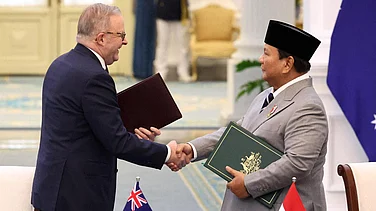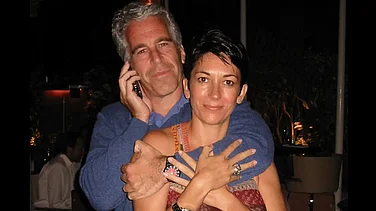This is the cover story for Outlook's 11 January 2024 magazine issue ''We Bear Witness'. To read more stories from the issue, click here
The truth never dies but is made to live as a beggar: Yiddish proverb
Palestine is the title of a book by Seth Anziska about the Israel/Palestine conflict. These two words sum up Western strategy towards Palestinian aspirations till this day. Fifty-six years after the occupation of Gaza and the West Bank (1967); 45 years after the Camp David Accords (1978), the Palestinians of the West Bank, Gaza Strip and East Jerusalem remain stateless non-citizens, suspended between limited autonomy and encroachment of Israeli settlements.
The author of an opinion piece on December 8, presented an argument about the ferocity of Israel’s response to Hamas’ October 7 attack. He argued that brutal sexual assaults on Israeli women by Hamas became evident after the hostage releases, and this reinforced the ferocity of the Israeli response. In a sense he is right, once violence takes over, we have entered the domain of evil. Communal violence reduces everyone to their identity—even Israeli peace activists became targets on October 7.
Hamas men who committed horrific sexual crimes on October 7 embraced evil, and all those who sympathise with the Palestinian struggle against a 56-year-long occupation should recognise this fact unconditionally.
But we need to recapitulate.
Nation-states as National Homes
For decades, the horrific crime of the Holocaust has been the backdrop for Israeli policy toward the Palestinians. (Antisemitism is historically a Christian form of bigotry, which holds Jews responsible for the crucifixion of Jesus). But the prehistory of the issue resides in the First World War, when Britain sought to use Arab nationalism as a weapon against the Ottoman Empire. The Arab revolt played a role in the war, and was based on assurances given to the Sharif of Mecca, wherein Turkey’s subjects would gain national governments. But Britain and France had secretly agreed to divide Asiatic Turkey between themselves.
In November 1917, Britain’s Foreign Secretary Authur Balfour announced Britain’s support for the establishment of a “national home for the Jewish people” in Palestine. This was the first use of the concept of ‘national home’. The UN documentation on Palestine disputes the status of the Declaration. After the war the victorious powers set up the League of Nations, and colonial territories of the defeated States were placed under a Mandate system. Balfour’s letter was included in the Mandate for Palestine. ‘The Declaration was legally impotent… Britain had no sovereign rights over Palestine… no authority to dispose of the land. The Declaration was merely a statement of British intentions…’.

Sir Edwin Montagu, Secretary of State for India and the only Jewish member of the British Cabinet, objected to the declaration on the ground that Judaism was a universal faith, distinct from nationality, and that the Jewish people were not a nation. He questioned the credentials of the Zionist Organization to speak for all Jews. In secret memoranda he wrote: “Zionism has always seemed to me to be a mischievous political creed…It is quite true that Palestine plays a large part in Jewish history, but so it does in modern Mohammedan history, and…surely it plays a larger part than any other country in Christian history…When the Jew has a national home, surely it follows that the impetus to deprive us of the rights of British citizenship must be enormously increased. Palestine will become the world’s ghetto.”
Nation-states tend to evolve into crucibles of intolerant ideologies and ethnic cleansing. It is significant that thoughtful Israelis have called for the repeal of the recently passed nation-state law. WW II and the Holocaust made Israel possible, but the great powers were not concerned about the plight of Palestinians. The Holocaust took the lives of thousands of the Romani and Sinti peoples too, something rarely mentioned by Western commentators.
During the 25 years of the Palestine Mandate, large-scale immigration took place, the numbers swelling with the notorious Nazi persecution of Jewry. The Jewish population increased from under 10 per cent in 1917 to over 30 per cent in 1947, when Britain approached the United Nations. The UN Special Committee was set up in May 1947; and UNSCOP’s deliberations are crucial to understanding what was at stake.
For the Jewish Agency, ‘‘The Jewish problem…was none other than the age-old question of Jewish homelessness, for which there was but one solution—that provided for by the Balfour Declaration and the Mandate;—the reconstitution of the Jewish national home in Palestine.’’ A European delegate insisted that the status of Palestine and the question of homeless Jews were separate issues, and linking them together would ‘‘render more difficult the solution of each’’. The Arabs argued that immigration and foreign financial support might result in Israel transforming itself into a bridgehead against the Arab world.
On November 29, 1947 the General Assembly resolved in favour of a Jewish State. It also adopted the United Nations Partition Plan for Palestine to divide the territory into an Arab state, a Jewish state, and an International Regime for Jerusalem. The plan was supported by the USA and the Soviet bloc. In more than half the area of Palestine, the Arabs were to be converted into a minority. A potential compromise drafted by Count Folke Bernadotte of UNSCOP was never discussed after his murder by the Stern Gang in September 1948. In April 1948, Zionist paramilitaries mounted an attack on the village of Deir Yassin. The idea was to push out the Arabs by military or psychological means. The resulting exodus was estimated at 726,000. Israel declared independence on May 15; and war became generalised. Arab states sent forces to Palestine, and after ten months, Israel controlled the territory allocated to the Jewish state along with nearly 60 per cent of Arab Palestine.
After 1948
In 1956 Israel, France and the UK launched a war on Egypt, after President Nasser nationalised the Suez canal. President Eisenhower forced the allies to give up the project. The 1967 war led to the capture of the West Bank from Jordan and Sinai from Egypt. The Camp David accords of September 1978 led to the return of Sinai to Egypt and an Egypt-Israel peace treaty in 1979. The section dealing with Palestinian statehood was rejected by the General Assembly because it was concluded without UNO and PLO participation.
Subsequent talks between Egypt, Israel, and the US from 1979 to 1982 were premised on a non-sovereign resolution to Palestinian aspirations. After the Middle East Accords of 1993-5, Yitzhak Rabin stated: ‘We do not accept the Palestinian goal of an independent Palestinian state between Israel and Jordan. We believe there is a separate Palestinian entity short of a state.’ This despite the fact that in 1988, the PLO had recognised Israel and accepted its right to exist in peace.
In July 2000 (Bill Clinton’s second term) the PLO accepted an agreement that left only 22 per cent of historic Palestine to the Palestinian Authority. Nevertheless, the two sides kept talking till 2001, and were close to an agreement. But Ehud Barak was defeated by Ariel Sharon, who did not want a Palestinian state and did not restart the talks. Israel now declared that the Clinton parameters “are not binding on the new government to be formed in Israel”.
The Saudi-sponsored Arab Peace Initiative of March 2002 was ignored by Israel. Meanwhile there took place two Palestinian uprisings. Hamas was founded in 1987 with an antisemitic programme till 2017, when it declared itself anti-Zionist, rather than anti-Jewish; and prepared to accept a two-state solution. Netanyahu succeeded Ehud Olmert in 2008, and followed a policy of aiding Hamas to undermine Palestinian nationalism. Some Israelis believe his extremist provocation to be primarily responsible for the latest outbreak. Hamas’ extremism was considered an asset by an extremist Israeli leadership.
The Embrace of Evil
In one of the earliest articles I wrote on Palestine I stressed the need for non-violent resistance. Violence destroys the conscience and renders us captive to the reptilian mind within. To attack members of any community or ethnicity for the mere fact that they have a particular identity is abhorrent and stupid, because it presumes upon uniformity of opinion within a community. Today, a vast section of public opinion refers to entire populations as bearers of guilt or innocence. Violence is spreading all over the world, innocent people are being targeted for no reason except their faith. Brutality has overtaken political issues. It is horrifying that over 20,000 Palestinians have died, and over 50,000 wounded.
The sight of corpses of Palestinian babies rotting in their cots in Gaza is no less a manifestation of evil before God and humanity. Anziska’s researches have revealed the extent of US/Israeli complicity in the ethnic cleansing of Palestinian refugees in Lebanon. On November 9, 2023, Anziska also wrote about the 1983 war, which showed the cost of Israel’s disavowal of the moral consequences of state power and sovereignty. Nor can we forget the assassination of Yitzhak Rabin by a Zionist fanatic in 1995. Meanwhile settlers on the West Bank have redoubled their efforts to ‘cleanse’ this area of Palestinians. It bears recalling that Netanyahu actually propped up Hamas for years, in order to divide Palestinians.
A former Mossad chief has described Israeli treatment of Palestinians as a version of apartheid. The ongoing crisis is another example of the dehumanisation of non-European peoples by Western establishments (with honourable exceptions). When some commentators talk about a new Marshal Plan for prosperity, I wonder: with over twenty thousand dead Palestinians, how are such schemes even possible? Can they acknowledge that Israel’s fight with the Palestinian people began 75 years ago? That the Western plan for Palestine has always been to prevent a sovereign state from coming into existence? Is it reasonable to think that survivors of this carnage will be amicably inclined towards Israel, and the USA?
The repercussions of this slaughter will last this century and beyond. It will not lead to any good end. Final solutions never do. And they are never final.
(Views expressed are personal)
Dilip Simeon is a public intellectual and scholar of the history of labour
(This appeared in the print as 'Unholy War')































